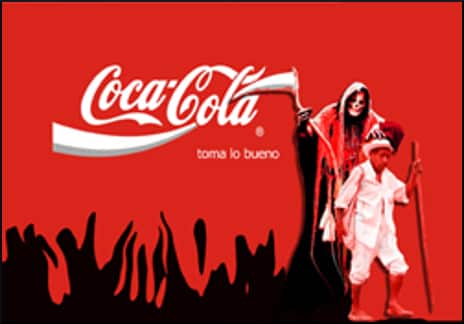
As a nation rife with obesity, Mexico ranks even above the U.S. Dr. Dariush Mozaffarian, senior author of a recent Tufts University study, has this to say:
In Mexico, where more than 10 percent of the population has diabetes, approximately 30 percent of the deaths among people under age 45 are due to sugary drinks… Mexico had the highest death rate attributable to sugar-sweetened beverages…
Why do some health-conscious websites continually pick on the Coca-Cola Company? Could it be because the corporation, like certain well-known historical figures (Genghis Khan, Attila the Hun, and Adolf Hitler come to mind), seems bent on conquering every square inch of the planet and luring all the inhabitants to submit to its will?
Like it or not, Coke is the both the stereotypical sugar-sweetened beverage and the archetypal symbol of American imperialism. It would be comforting to believe that this is an exaggeration, but KillerCoke.org would not agree. The organization devotes itself to tracking Coke’s misbehavior all over the world. For example, this sentence basically sums up the case:
In Mexico, citizens, while also being exploited in terms of labor, are indirectly forced to drink Coca-Cola because of the lack of water supply due to Coca-Cola’s use of it.
Think about it. There is only so much water, and only so many ways of getting it out of the ground. If a multinational behemoth of a corporation comes in and secures access to all the water, what else can people do except buy Coke and pour it into themselves and their kids until their teeth rot out?
On KillerCoke’s list of 10 reasons to quit, one of them is that Coke creates addiction!
Here is another thing. When the company staffs its “south of the border” factories and offices, it does not have to follow picky American rules about fair hiring practices, discrimination, or any of that.
Oh, and by the way, organized labor? Forget about it. Precept #9 states that the company “has been linked to murders, torture, disappearances, death threats of trade-union members.” Those executives are serious about manufacturing the product at the cheapest rates and deriving the maximum profit.
Just when you think the picture could not become any more hideous, it does, because in indigenous communities the average Mexican spends as much as 17.5% of the minimum daily wage on Coke products. That’s almost one-fifth of a poor person’s income. The Coca-Cola Company is making out like a bandito!
Back in the States, Coke did its best to co-opt Hispanic Heritage Month (mid-September to mid-October) by making a film called “Orgulloso De Ser,” or “Proud to Be.” Why? To advertise a special line of Coke cans with temporary tattoos attached, which could be applied to the skin.
The tattoos were of many traditional Mexican surnames, with all the proper accent marks, “to make their pride and passion for their heritage known to the world.” The film can be found on this Facebook page, along with some nice words and many disparaging comments like these:
“Latin is a dying language and Latinos are from Italy not from the Americas. Stop using that concept already and stop drinking diabetes aka Coca Cola.” — Eduardo Javier Aguilar
“This campaign is offensive… If you want to honor Latinos, why don’t you sponsor scholarships for all the hard-working Latino students in this country?” — Theresa C. Lopez
“This commercial is messed up on so many levels…” — Danny Santana
“Am I the only one who’s raising his middle finger to Coca-Cola right now?” — Rafael Garcia
Your responses and feedback are welcome!
Source: “Sugary Drinks Kill 184,000 People Every Year,” Livecsience.com, 06/29/15
Source: “Coca-Cola: The Savage Quest for Liquid Money,” Blogspot, 05/08/11
Source: “Coke’s Crimes in Mexico,” KillerCoke.org, 2010
Source: “Coca-Cola on Hispanic Heritage Month: #OrgullosoDeSer Campaign Celebrates Family, Culture… ,” Latinone.com, 09/03/15
Source: “More Videos by Coca-Cola,” Facebook, 09/02/15
Image: Unattributed Internet meme

 FAQs and Media Requests:
FAQs and Media Requests: 











